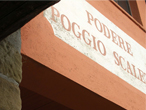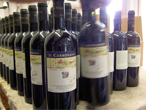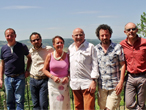 |
 |
 |
 |
information

Podere Poggio Scalette
Via Barbiano 7 – Località Ruffoli 50022 Greve in Chianti (FI)
Podere Poggio Scalette became an independent Wine Estate in 1991, when Vittorio Fiore and his wife Adriana Assjè di Marcorà bought, on the Ruffoli hill – in Greve in Chianti Municipality (Florence) – several land plots and a rural building from an inheritance division and disposal of several real estate pieces, including farm houses, vineyards, olive groves, pasture and woods, that had been neglected for years, since the death of the previous owner.
In 1996, another plot was added, following the purchase of the adjacent property, provided with working cellar and extensive buildings, bringing the Estate total area to about 40 hectares (around 80 acres).
Taking care of each and every aspect of the Estate are Vittorio Fiore’s wife, Adriana Assjè di Marcorà, and his son Jurij Fiore, with his supervision.
The slope of the Greve valley, between Greve in Chianti and the Panzano fraction, facing west (Ruffoli hill), is unanimously considered one of the best sites to grow vines and olive trees, in order to gain the maximum quality expressions thus obtaining the great Chianti Classico Area wines and the marvellous extra virgin olive oil. The vineyards and olive groves of PODERE POGGIO SCALETTE are located in an area ranging between 350 and 500 mts above sea level.
The Estate’s name originates from the landscape of the surrounding hills, distinguished by marvellous dry stone walls, built to support terraces of all sizes, on which vines and olive trees groves alternate according to the soil characteristics and that – when seen from a distance – give the impression of a series of stairs climbing the Ruffoli hill slopes.
On these terraces and on a large land plot named “IL CARBONAIONE” by local farmers, are situated Sangiovese vines that – we discovered – have been the first vines to be planted in the decade following the end of World War I (1914-1918), following the destruction of most of European vineyards because of Philloxera, towards the end of 1800s.
Thus these are vines that have reached the venerable age of over 90 years and that are, without doubt, one of the very rare – if not the only – examples of the famous “Sangiovese di Lamole” original clone presence inside the Chianti Classico territory.
